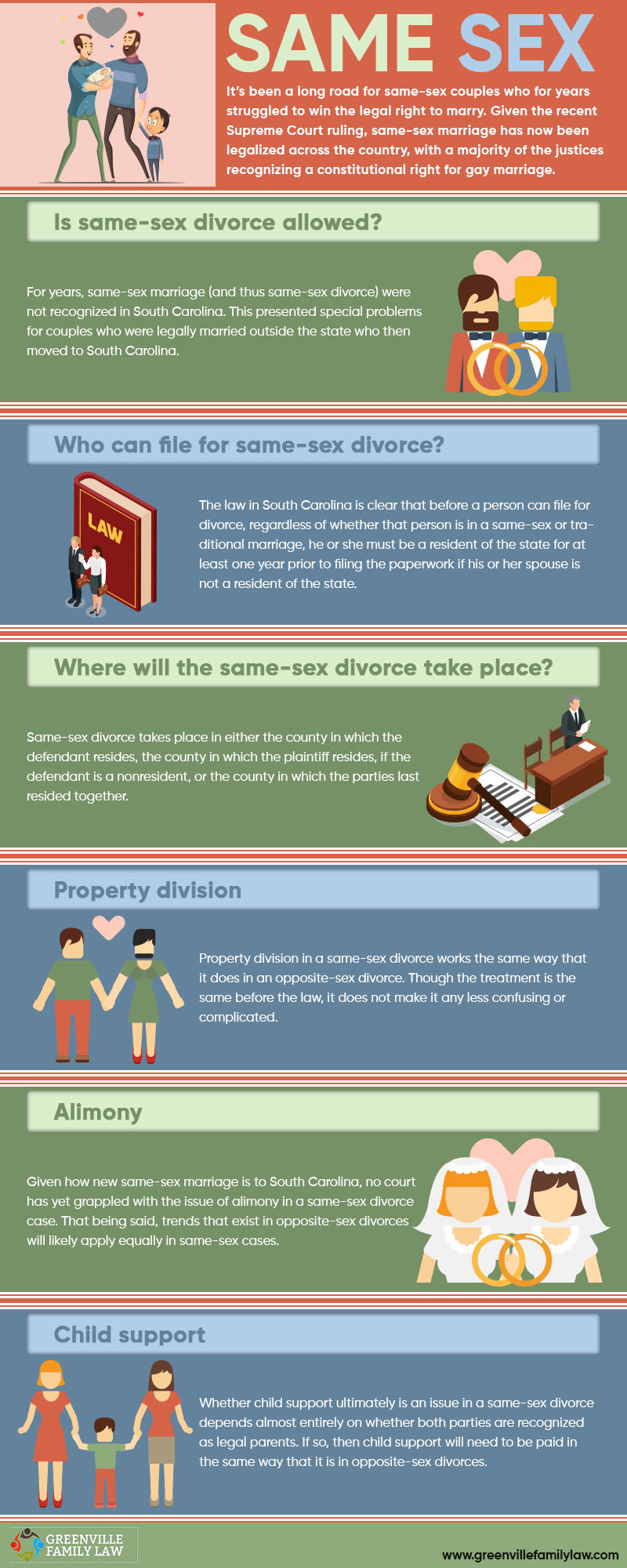It’s been a long road for same-sex couples who for years struggled to win the legal right to marry. Given the recent Supreme Court ruling, same-sex marriage has now been legalized across the country, with a majority of the justices recognizing a constitutional right for gay marriage. Though the ability to marry is cause for celebration, an unfortunate reality is that same-sex divorce will also follow suit. To find out more about same-sex marriage and divorce issues, keep reading.
Is same-sex divorce allowed?
For years, same-sex marriage (and thus same-sex divorce) were not recognized in South Carolina. This presented special problems for couples who were legally married outside the state who then moved to South Carolina. For instance, a couple from Boston, Massachusetts who were legally married in that state could find themselves stuck in a marriage that was not recognized should they decide to relocate to Greenville, SC. This presented the real problem of same-sex couples who were able to marry, but if they moved, would not be allowed to divorce.

Today, thanks to the recent Supreme Court ruling, same-sex divorce is a much easier process. Like all other couples in South Carolina, same-sex couples can divorce following the same set of rules as everyone else. No need to remain trapped in a bad marriage or move to another state where divorce is allowed.
Who can file for same-sex divorce?
The law in South Carolina is clear that before a person can file for divorce, regardless of whether that person is in a same-sex or traditional marriage, he or she must be a resident of the state for at least one year prior to filing the paperwork if his or her spouse is not a resident of the state. If the plaintiff is a nonresident, then the defendant must have resided in the state for at least one year prior to filing for the divorce. In those cases where both parties are residents of South Carolina, the plaintiff needs only have resided in the state for three month prior to filing.
Where will the same-sex divorce take place?
Same-sex divorce takes place in either the county in which the defendant resides, the county in which the plaintiff resides, if the defendant is a nonresident, or the county in which the parties last resided together. The only exception is if the plaintiff is a nonresident, in which case, the divorce must take place in the county where the defendant resides.
Property division
Property division in a same-sex divorce works the same way that it does in an opposite-sex divorce. Though the treatment is the same before the law, it does not make it any less confusing or complicated. Same-sex couples in the midst of a divorce will need to file the same financial disclosure of assets, listing all items of value as well as debts. Based on this, couples will then need to reach an equitable division of assets. Though equitable division attempts to fairly divide marital property, this division is not always 50/50. Bank accounts, retirement accounts, stocks, bonds, personal property and real estate will all need to be divided. As with opposite-sex couples, the person who keeps the house must be sure that he or she can afford to not only buy out the other partner’s interest in the home, but also continue to maintain the house alone after the divorce.
 Alimony
Alimony
Given how new same-sex marriage is to South Carolina, no court has yet grappled with the issue of alimony in a same-sex divorce case. That being said, trends that exist in opposite-sex divorces will likely apply equally in same-sex cases. Alimony has been increasingly under attack, with judges and juries more inclined to limit the amount and duration of alimony awards to encourage spouses to find work and support themselves. When alimony is awarded, it is often done so in cases of very lengthy marriages where one party gave up a career to either look after the home or care for the children. This sacrifice is seen as deserving of compensation and alimony is the tool used to extract the compensation.
With same-sex divorce, as with opposite-sex divorce, it is unlikely that alimony would be awarded in short-term marriages. For a spouse to win a claim for alimony, he or she would need to show that they had become dependent on the other party’s income and that he or she would be unable to support him or herself. Even then, a court may not be sympathetic and limit the duration of alimony to a short enough period of time to allow the person to get an education or begin searching for a job before cutting them off completely.
Custody issues
Unfortunately, one of the areas that same-sex couples experience the most frustration (and sometimes, devastation) involves child custody matters. Though it would seem that the same rules should apply across the board, legal issues that arise from adoption and surrogacy can add wrinkles to same-sex custody arrangements that are not present in cases of opposite-sex couples and their biological children.
When both are legal parents:
This is the easiest possible scenario and mirrors what happens to opposite-sex couples in South Carolina. For those who have children born into a marriage where parental rights are conferred on the biological as well as non-biological parent or those who jointly adopt a child, things are much simpler. In these cases, both parents have equal rights to see and visit the child. Child-related disputes are handled the same way as in opposite-sex divorces and judges must weigh competing claims between the parents with the best interest of the child. Before the law, parents with legal rights are seen as equal, something that is sadly not always the case.
When only one person is a legal parent:
If only one party is the legal parent, unfortunately, the custody situation becomes much more difficult. This can happen for a variety of reasons, often because only one parent in a same-sex couple is the biological parent or only one party adopted the child initially. In states where second parent-adoption isn’t available, it can be difficult if not impossible for the non-legal parent to assert a custody claim. In many states, second parents are seen as having no rights whatsoever when it comes to the child. That means no claims for legal or physical custody will be considered by a court. Even visitation is often off the table.
More than any other area, it is critical that when it comes to custody issues, same-sex couples seek the advice of an experienced South Carolina family law attorney. The rules can be very complex when it comes to adoption and second-parent rights. The consequence of not seeking legal advice early can be devastating to the parent who never secured proper legal rights and could even result in totally losing contact with a child you considered your own.
Child support
Whether child support ultimately is an issue in a same-sex divorce depends almost entirely on whether both parties are recognized as legal parents. If so, then child support will need to be paid in the same way that it is in opposite-sex divorces. South Carolina has published guidelines on the subject and incomes and expenses are plugged into a calculator to determine who is responsible for paying what.
If, however, only one party is recognized as the legal parent, the other will not be seen to have financial responsibility for the child. That means the other party will not be told to contribute money for child support if the child is not legally his or her own.



